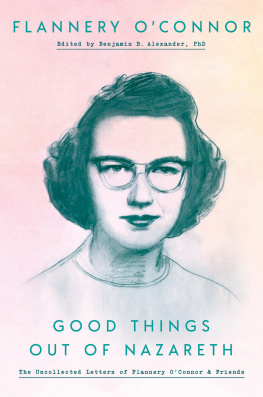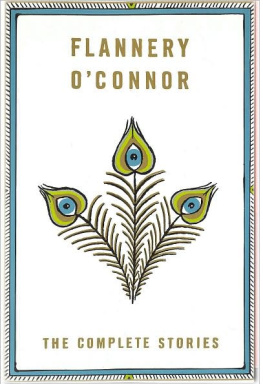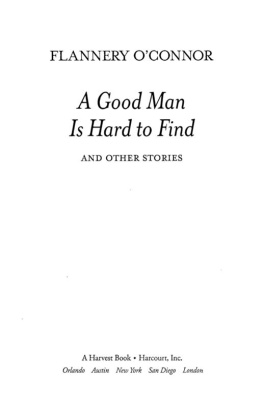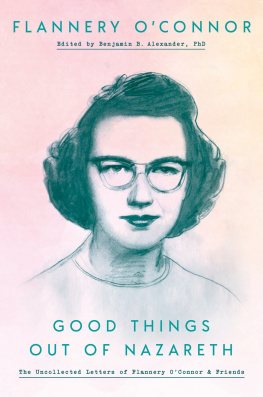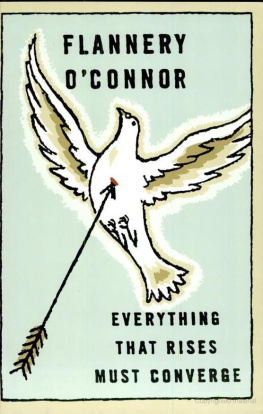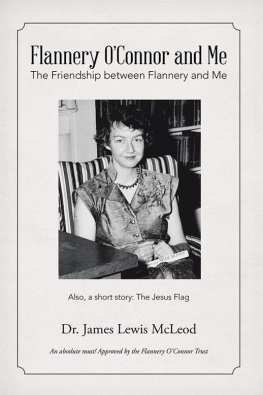Flannery OConnor - Good Things Out of Nazareth ; The Uncollected Letters of Flannery OConnor and Friends
Here you can read online Flannery OConnor - Good Things Out of Nazareth ; The Uncollected Letters of Flannery OConnor and Friends full text of the book (entire story) in english for free. Download pdf and epub, get meaning, cover and reviews about this ebook. year: 2019, publisher: The Crown Publishing Group, genre: Art. Description of the work, (preface) as well as reviews are available. Best literature library LitArk.com created for fans of good reading and offers a wide selection of genres:
Romance novel
Science fiction
Adventure
Detective
Science
History
Home and family
Prose
Art
Politics
Computer
Non-fiction
Religion
Business
Children
Humor
Choose a favorite category and find really read worthwhile books. Enjoy immersion in the world of imagination, feel the emotions of the characters or learn something new for yourself, make an fascinating discovery.
- Book:Good Things Out of Nazareth ; The Uncollected Letters of Flannery OConnor and Friends
- Author:
- Publisher:The Crown Publishing Group
- Genre:
- Year:2019
- Rating:4 / 5
- Favourites:Add to favourites
- Your mark:
- 80
- 1
- 2
- 3
- 4
- 5
Good Things Out of Nazareth ; The Uncollected Letters of Flannery OConnor and Friends: summary, description and annotation
We offer to read an annotation, description, summary or preface (depends on what the author of the book "Good Things Out of Nazareth ; The Uncollected Letters of Flannery OConnor and Friends" wrote himself). If you haven't found the necessary information about the book — write in the comments, we will try to find it.
Flannery OConnor: author's other books
Who wrote Good Things Out of Nazareth ; The Uncollected Letters of Flannery OConnor and Friends? Find out the surname, the name of the author of the book and a list of all author's works by series.
Good Things Out of Nazareth ; The Uncollected Letters of Flannery OConnor and Friends — read online for free the complete book (whole text) full work
Below is the text of the book, divided by pages. System saving the place of the last page read, allows you to conveniently read the book "Good Things Out of Nazareth ; The Uncollected Letters of Flannery OConnor and Friends" online for free, without having to search again every time where you left off. Put a bookmark, and you can go to the page where you finished reading at any time.
Font size:
Interval:
Bookmark:
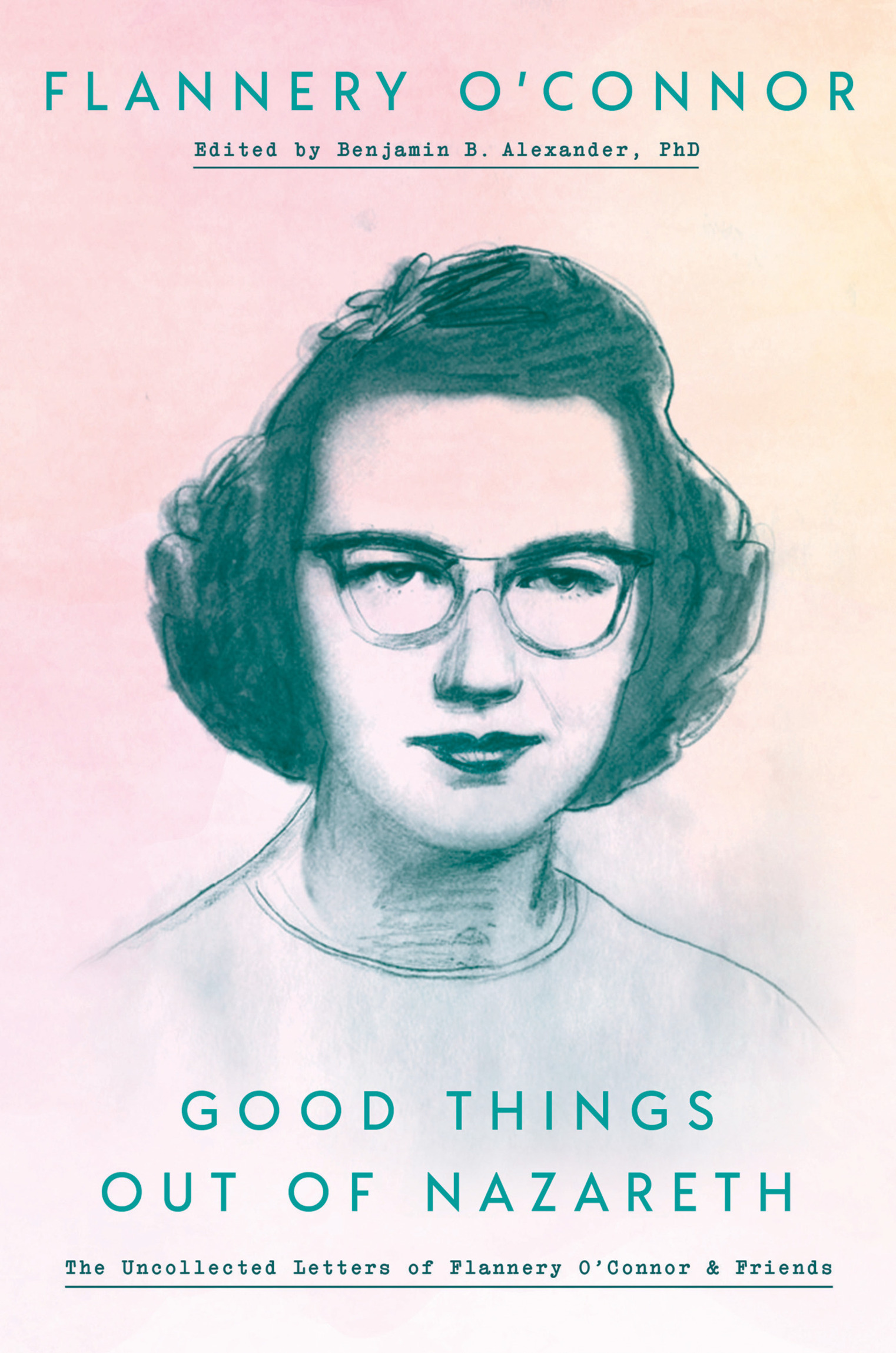
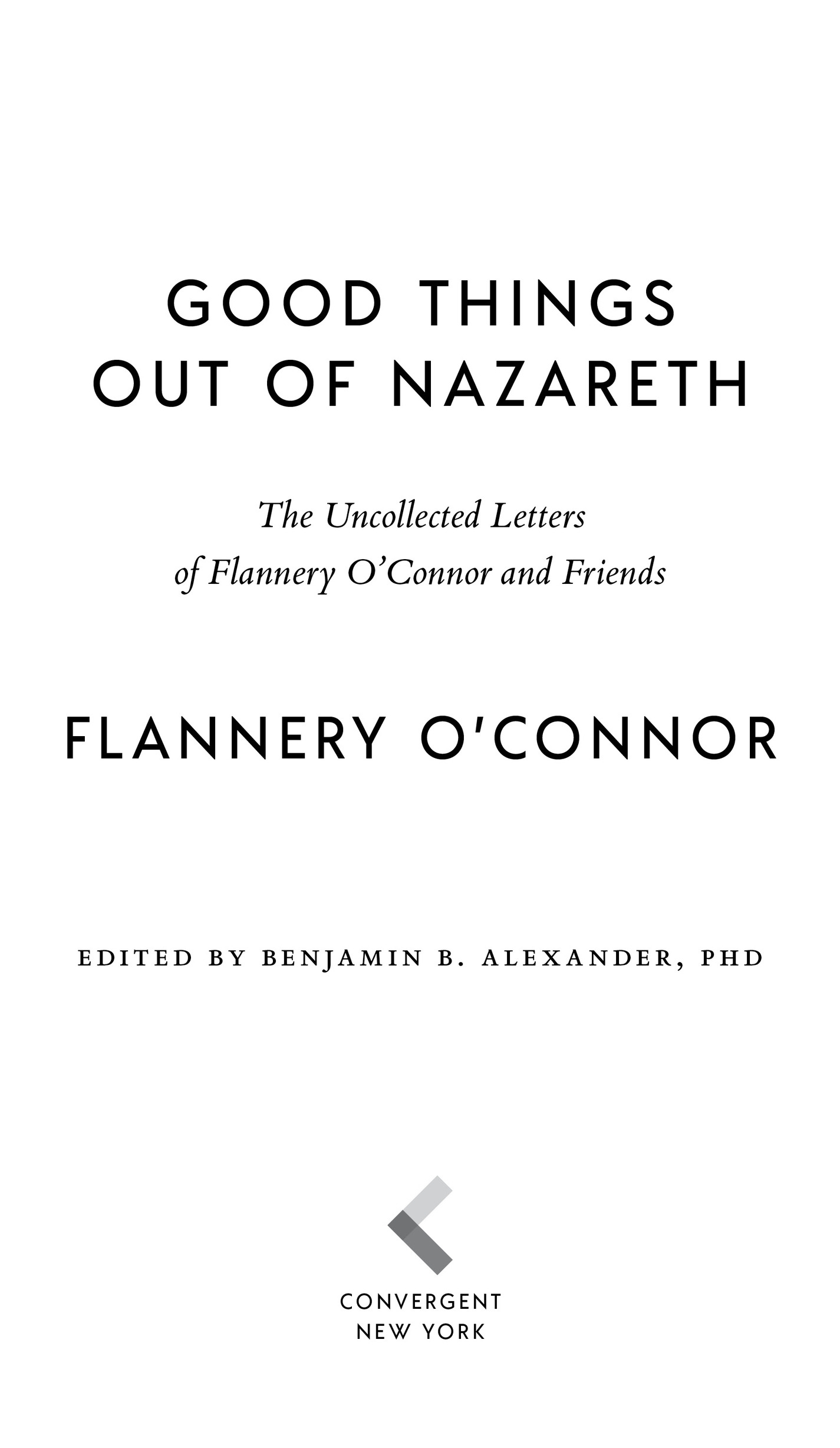
Copyright 2019 by Benjamin B. Alexander
All rights reserved.
Published in the United States by Convergent Books, an imprint of Random House, a division of Penguin Random House LLC, New York.
convergentbooks.com
CONVERGENT BOOKS is a registered trademark and its C colophon is a trademark of Penguin Random House LLC.
Grateful acknowledgment is made to the following for permission to use the material below:
Caroline Fallon: Previously unpublished Caroline Gordon letters used by permission of Caroline Fallon. All rights reserved.
The Mary Flannery OConnor Charitable Trust: Letters of Flannery OConnor copyright The Mary Flannery OConnor Charitable Trust. All rights reserved. Permission granted by the Mary Flannery OConnor Charitable Trust via Harold Matson Co., Inc.
The Paul Engle Estate: Previously unpublished Paul Engle letter used by permission of Hualing Engle, on behalf of the Paul Engle Estate. All rights reserved.
The Permissions Company, LLC, on behalf of the Katherine Anne Porter Literary Trust: Previously unpublished Katherine Anne Porter letters used by permission of The Permissions Company, LLC, on behalf of the Katherine Anne Porter Literary Trust, www.permissionscompany.com. All rights reserved.
The Robert Giroux Estate: Previously unpublished Robert Giroux letter used by permission of Hugh McKenna, on behalf of the Robert Giroux Estate. All rights reserved.
Farrar, Straus and Giroux, on behalf of the Robert Lowell Estate: Unpublished letter written by Robert Lowell to Flannery OConnor dated January 30, 1960. Copyright 2019 by Harriet Lowell and Sheridan Lowell. Printed by permission of Farrar, Straus and Giroux on behalf of the Robert Lowell Estate. All rights reserved.
The Walker A. Percy Estate: Previously unpublished letters of Walker A. Percy copyright 2019 by Ann Percy Moores and Mary Prett Lobdell. Reprinted with permission of McIntosh & Otis, Inc. All rights reserved.
Library of Congress Cataloging-in-Publication Data is available upon request.
ISBN9780525575061
Ebook ISBN9780525575078
Cover design: Jessie Sayward Bright
Cover illustration: Vivienne Flesher
v5.4
ep
Flannery OConnor is a master of the American short story, joining, since her untimely death in 1964, Hawthorne, Poe, Hemingway, and Faulkner in the literary canon. Now a fixture in textbooks and collections, she always maintained a powerful ethical vision rooted in a quiet, devout faith. It informed all that she wrote and did.
She was born in 1925 in Savannah, Georgia, but she lived most of her life on a dairy farm in Milledgeville, Georgia, raising peacocks. OConnor practiced her craft in a modest room near an ample front porch, where she received many visitors. She composed on an old typewriter with bookshelves nearby of modern fiction, philosophy, and theology unique among American writers. The novels of William Faulkner, the American Virgil, beside the rich theological writings of the angelic doctor, Thomas Aquinas, testified to wide study. Novels by the Russians, along with volumes of the serene German theologian, Romano Guardini, occupied a shelf. The massive work of arguably the most penetrating political theorist of the twentieth century, Eric Voegelin, had another space. Such works and many others in OConnors library gave me a rich reading list that I have tried to pursue. When I first saw the actual setup of OConnors room, I was moved by the austerity. In the corner was a narrow iron bed where OConnor spent sleepless hours courageously enduring lupus, which would take her life at the young age of thirty-nine.
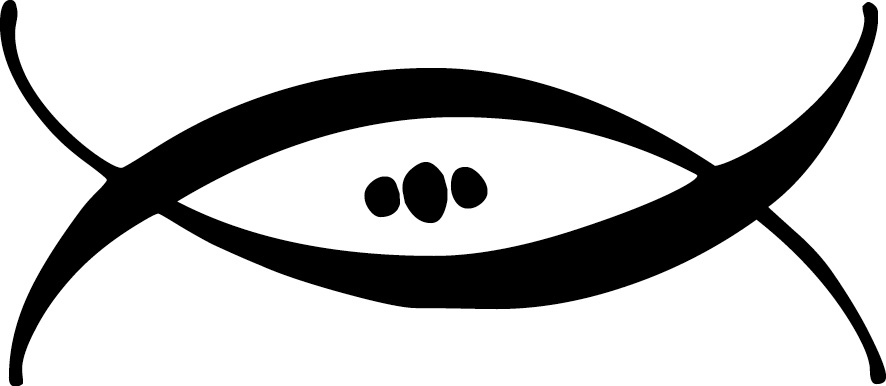
OConnor left a body of fiction featuring a combination of violence and sacramental truths that continues to stun readers. Sensational action at the point of a gun or the end of a rope reminds them of what they see on television. OConnor was a careful observer of the medium in its early days. Slow-motion, rarefied stories might have entertained readers of earlier times, but not in the age of moviegoers, as OConnors compatriot writer, Walker Percy, revealed. OConnor recognized that her readers were becoming increasingly conditioned by television and cinema, causing her to pack dramatic action into her stories. She once noted, To the hard of hearing you shout, and for the blind you draw large and startling pictures.
OConnors strategy still wakes up somnambulant English classes. OConnor can still break through a dull lecture with a story in which a Bible salesman steals the wooden leg of an atheist philosopher (Good Country People) or an impudent teenager hurls a book at a racist old lady in a segregated waiting room, calling her an old wart hog from hell (Revelation).
I will always remember I first heard that OConnor phrase in an undergraduate class in the late 1960s. Those days of campus radicalism and opposition to the Vietnam War imbued many students with a loathing of their country that still endures on college campuses today. The Kent State shootings were shocking and paralleled the murders of the innocent in an OConnor story. In 1969, I enrolled in a course taught by Andrew Lytle who had taught OConnor at the Iowa Writers Workshop. There he had witnessed OConnor herself reading Wise Blood to a class. An accomplished novelist and critic in his own right, Lytle performed OConnors stories dramatically in the classroom. The nasal drawl of the Misfit was unforgettable. Lytle revealed OConnors dialect and power to distracted students, like me. We became woke. I soon wanted to understand OConnor better and teach her stories from the other side of the desk.
The academic vocation has proved daunting at times, but my students, many outside the South, have responded more readily to her writing than to other masters, such as Faulkner or Hemingway. Teaching OConnor became easier in 1979 with the publication of her letters, The Habit of Being. New readers, my own mother among them, read and re-read her letters, delighting in the infectious humor and pithy wisdom. A less startling voice than the one in the stories often spoke. OConnors letters made her fiction more understandable. They also revealed OConnor as an apologist for the faith and spiritual director for a few searching friends. OConnor nourished my own spiritual hunger in the 1970s left unfed by the imploding Episcopal Church that had irrationally jettisoned its historic Elizabethan prayer book. Often amused at OConnors unparalleled sense of humor, I also was instructed by her unflinching catechesis.
Having marked up three copies of The Habit of Being, I heard at academic conferences that there were more unpublished OConnor letters. She often wrote to a Jesuit priest, the Rev. James H. McCown, who appears sparingly in TheHabit of Being. He visited her many times at the Georgia farm. This vital, unexplored friendship contributed to OConnors creation of Ignatius Vogle, S. J., in her story The Enduring Chill. Father McCown introduced OConnor to Thomas and Louise Gossett, both credentialed academics. From 1956 through OConnors death in 1964 and afterward, Thomas Gossett collected her letters to Fr. McCown. (He died in 1991.) In 1972, Gossett, a pioneer in African American studies (a role OConnor admired), shared the OConnor letters with her editor-friend Robert Giroux, who encouraged their publication. In 1974, Gossett wrote the first article about the riches of OConnors letters and hoped to be the first to publish them.
Font size:
Interval:
Bookmark:
Similar books «Good Things Out of Nazareth ; The Uncollected Letters of Flannery OConnor and Friends»
Look at similar books to Good Things Out of Nazareth ; The Uncollected Letters of Flannery OConnor and Friends. We have selected literature similar in name and meaning in the hope of providing readers with more options to find new, interesting, not yet read works.
Discussion, reviews of the book Good Things Out of Nazareth ; The Uncollected Letters of Flannery OConnor and Friends and just readers' own opinions. Leave your comments, write what you think about the work, its meaning or the main characters. Specify what exactly you liked and what you didn't like, and why you think so.

